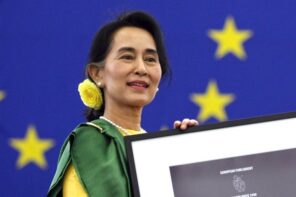In the 41 years since its independence, Bangladesh has made great strides. Until recently one of the poorest nations on Earth, poverty is fading. The country has made remarkable gains in reduction of hunger, and now ranks among Goldman Sachs’ “Next Eleven” list of the up-and-coming developing nations. This change has been due, in part, to the country’s sole Nobel Peace Prize winner, Muhammad Yunus, the Grameen Bank founder who reduced poverty by offering microloans to poor women.
Inside the country, however, gratitude for Yunus is spare these days. Last month, Malona Moniruzzaman Rabbanni, a cleric at Dhaka’s National Mosque, announced a protest against Yunus for October 31, telling AFP, “We have asked all Muslims to be united against Yunus’s move to destroy our family and society.” The group alleged Yunus is “un-Islamic” and “promoting homosexuality.”
The direct antecedent to the allegation of “un-Islamic” behavior was a move considered highly unusual in majority-Muslim Bangladesh: public support for gay rights.
In June 2012, Yunus signed a letter advocating fair treatment of LGBTI people in Uganda. The African nation was then considering a draconian law that imposed the death penalty on gay Ugandans. The letter, signed by a distinguished group of signatories and released via the Robert F. Kennedy Center for Justice and Human Rights, was one of several international efforts to oppose the legislation. The document, which read, “By expressing our solidarity with LGBTI people around the world, we recognize the inherent dignity and human rights of all individuals, without prejudice or intolerance,” received little public response.
More than a year later, however, Yunus’ pro-gay rights stance has become a flashpoint inside Bangladesh. On October 1 of this year, organizers announced an upcoming protest against the 73-year-old economist, alleging his support of gay rights harms the country. As the delayed reaction implies, the situation is less about a religious debate on homosexuality than a brewing political storm of another sort.
In recent years, Bangladeshi politics have been dominated by two family dynasties. The current ruling party, the Awami League, is headed by Sheikh Hasina, daughter of Bangladesh’s first Prime Minister, Sheikh Mujibur Rahman. Khaleda Zia, the widow of high-ranking general Ziaur Rahman, leads the opposition Bangladesh National Party (BNP). The two women have repeatedly traded places as Prime Minister through chaotic and sometimes bloody elections. (The last round, in 2008, resulted in a brief imposition of martial law.) The country is now due for another.
The centrist Awami League began to oppose Yunus after he announced his political ambitions in an imprudent op-ed several years ago. Sheikh Hasina’s opposition to Yunus reflects, in part, the Nobel Peace Prize-winner’s potential as a powerful political competitor. The government administers the national mosque that announced the anti-gay protest.
Notably, opposition leaders have embraced Yunus despite their alliance with Islamic fundamentalist party Jamaat Islami and their broad disagreements with a pro-gay stance. In addition, the US government is reacting to Awami League’s rejection of Yunus by affiliating more closely with opposition leaders. Rather than an exemplar of the deep religious split in Bangladeshi society, Yunus effectively scrambles the division. Religion, in other words, has little to do with the uproar.
The people also appear to want nothing to do with last month’s Muslim protests against Yunus. While other fundamentalist Islamic protests have drawn crowds of up to two million people, this event seems to have drawn very few. Even as U.S. Ambassador Dan Mozena flew to Washington for reported emergency meetings on the upcoming election, the U.S. Department of State, which issues frequent announcements about protests to Americans living in Bangladesh, did not warn of any event on October 31.
The last time protests erupted over Yunus, they were intended to support him. In 2011, Prime Minister Sheikh Hasina ousted Yunus from Grameen Bank. The move triggered the dissent of thousands of Grameen Bank employees, one of whom said, “We think his dismissal is politically motivated and part of a long campaign to humiliate him.”
That campaign goes on, making pawns not only of religious adherents but also the impoverished people who Yunus has helped. Last month, the government passed an unpopular law taking much broader control of Grameen Bank. Yunus, who calls the gay issue “a new front to attack me,” also says, “Attack me as a person if you don’t like me, but what wrong has the bank done? The bank is owned by the poor women…. The bank should be under the control of those women.”



